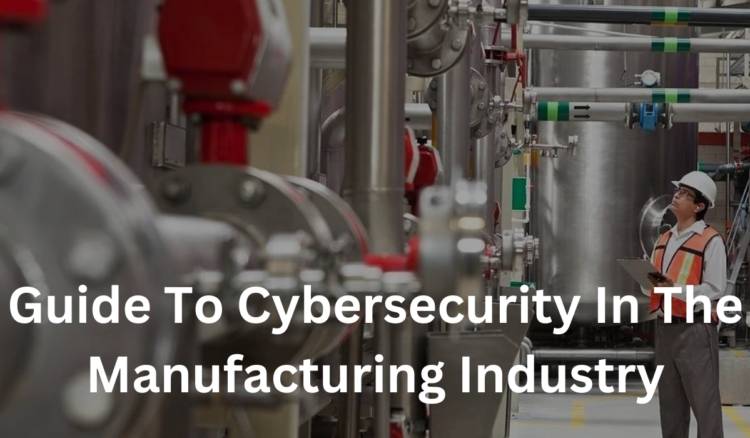Cybersecurity is a crucial threat to all genres of society presently. From individuals to companies and even manufacturing units, no one is saved from this potential threat of robberies and plunders happening through it. Especially the manufacturing industry is in grave danger and requires maximum protection from cyber threats. Though many significant leaders are considering internet safety options for their businesses, cybersecurity in the manufacturing industry is still not known to most of them. This post takes you to the depth of this system, guiding accurately the importance of cybersecurity in the manufacturing industry and ways to carry it out efficiently.
Meaning of cybersecurity in the Manufacturing industry
Cybersecurity in the manufacturing industry is a comprehensive set of practices and methods to protect digital systems, networks, and vital data against unauthorized access, cyberattacks, and possible breaches. The manufacturing industry’s growing dependence on digital technologies, automation, and data analytics emphasizes the importance of strong cybersecurity practices. It’s not only about security; it’s about ensuring operational continuity and sustaining customer and stakeholder trust.
Importance Of CyberScurity In the Manufacturing Industry
The fourth industrial revolution saw the birth of smart factories, industrial IoT (IIoT)-enabled devices, enhanced analytics, and more. However, as technology advances, so do the hazards it poses. In 2022 alone, roughly a quarter of all identified cyberattacks were directed at industrial enterprises. The manufacturing industry is strongly reliant on supply chains and involves a large number of vendors and suppliers. As a result, striking these factories cripples the heart of the supply chain and prohibits enterprises from meeting client demands. Because of this, threat actors regard such attacks as ransom multipliers capable of generating millions in ill-gotten gains.
The manufacturing industry is vulnerable to cyberattacks because it is a critical element of complicated supply networks. Any security flaws might allow attackers to obtain unauthorized access, inject malicious code, or disrupt operations. In addition to disrupting services and the whole supply chain, the attack surface may quickly spread from here if it goes unnoticed.
Furthermore, developing industrial IoT devices and increasing interconnectedness between endpoints has accelerated the threat environment. Because of their network connectivity, any connected gadget has become a possible entryway for attackers. This exposes vital infrastructure to cyber attacks that can interrupt operations and jeopardize safety, such as business networks, industrial control systems (ICS), and intellectual property.
Assessing risk and management
- Identification of key Assets – Careful identification of key assets and possible vulnerabilities forms the basis of an all-encompassing cybersecurity plan. Manufacturers need to consider how cyber events can affect their business carefully. An effective risk management strategy may be created using the data from this thorough risk assessment.
- Preventive Actions – Addressing vulnerabilities necessitates the implementation of several preventive actions. The defense mechanisms against cyber attacks are strengthened by solid firewalls, sophisticated intrusion detection systems, encryption protocols, and modern endpoint security solutions.
- Protocols for Incident Response – In the unfortunate case of a cyber incident, a well-laid-out incident response strategy takes center stage. This strategy should include tactics to coordinate a speedy and successful restoration to regular operations and outline precise actions for isolating impacted systems and looking into the breach.
Authentication and Access Control
- Role-Based Access Control – It is essential to create strict access controls to guarantee that users, whether employees, suppliers, or contractors, only have access to the systems and data necessary for their tasks. This strategy dramatically limits the possibility of unauthorized access to critical data.
- Multi-factor authentication – This adds an additional layer of protection when it is integrated. Before getting access, it requires users to submit many kinds of verification, greatly enhancing security against bad actors trying to use stolen credentials.
Updates often and patch management:
Software vulnerability mitigation – Because of its acknowledged flaws, outdated software is a popular target for hackers. Reducing the possible attack surface and mitigating these vulnerabilities depend heavily on adopting a proactive approach to software upgrades and rigorous patch management.
Employee Education and Information
- Human-Centric Approach – Manufacturers should embrace an ongoing staff training strategy, acknowledging that human error is a significant cause of cybersecurity breaches in the manufacturing industry. Employees will learn about common cyber dangers, get security best practices, and be equipped to recognize and report possible attacks, such as sophisticated phishing efforts.
- Phishing Awareness – Given the frequency of phishing assaults, expert instruction in spotting phishing emails is essential. Employees are often exposed to phishing attack simulations, improving their ability to distinguish between trustworthy and fraudulent emails and strengthening the organization’s overall security posture.
Cooperation with Outside Vendors
Vendor Cybersecurity Standards – Working with outside vendors is expected in the increasingly linked industrial environment. It is essential to uphold strict cybersecurity requirements for these partners. Manufacturers must include clear cybersecurity criteria in vendor contracts to maintain compliance and reduce possible external threats and carry out routine evaluations.
Response to an incident and recovery
Comprehensive Planning – Since no defense system is impenetrable, careful planning for anticipated cyber events is crucial when incorporating cybersecurity in the manufacturing industry. A thorough and flexible incident response plan should consider various potential circumstances. It must contain specific instructions for isolating affected systems, performing in-depth investigations into breaches, and carrying out an expedited return to normality.
Testing And Simulation
It is impossible to stress the importance of routinely testing and modeling incident response strategies. Manufacturers may hone and perfect their incident response plans by using these simulated cyberattack scenarios as a litmus test to reveal any possible flaws or vulnerabilities.
Safety in the Supply Chain
- Supply chain security issues – The global supply chains used by the contemporary industrial sector are incredibly complex. While these networks increase productivity, they also present new cybersecurity problems. Manufacturers must consider the security of every link in their supply chain, from distributors to providers of raw materials. Cybercriminals may take advantage of gaps in the supply chain to obtain access, compromise goods, or steal confidential information.
- Supply Chain Security – Manufacturers should thoroughly evaluate the cybersecurity of their supply chain partners. This entails assessing their cybersecurity compliance, standards, and practices. Contracts with vendors should clearly state expectations for cybersecurity and demand adherence to standard security measures. Supply chain partners must be subject to frequent audits and continuous monitoring to guarantee continued compliance.
The industrial sector faces limitless opportunities and complex problems as it navigates the digital world. Technology integration has great potential, but it also needs proactive cybersecurity precautions. Providing top priority to cybersecurity in the manufacturing industry through detailed risk assessment, network segmentation, access restrictions, proactive upgrades, ongoing staff training, and an all-encompassing incident response structure is imperative. Manufacturers need cybersecurity as a basic pillar to resist the changing threat landscape; it is not an add-on. Manufacturers may safeguard their digital infrastructure while also ensuring operational resilience, customer trust, and long-term success in the face of a constantly changing cyber world by carefully integrating these cybersecurity solutions in the manufacturing industry.
Also Read:






























































